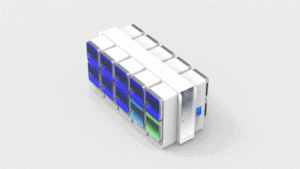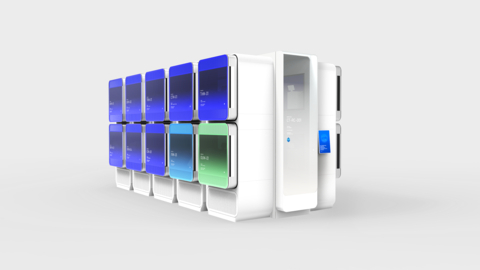SAN FRANCISCO– The robotic cell therapy manufacturing Consortium founded by Multiply Labs, with initial participation from UCSF and Cytiva, announced today that Thermo Fisher Scientific and Charles River Laboratories, Inc. are joining. The Consortium members have a broad range of expertise in cell therapy manufacturing technologies. The goal of the multi-disciplinary Consortium is to develop and validate a cGMP-compliant robotic manufacturing system that is capable of manufacturing gene modified cell therapies at industrial scale.
 Consortium members recognize that automation of advanced living drugs is an industry-defining technology with broad implications for the whole cell therapy field. Traditional manufacturing workflows can require hours of manual manipulation of cells and consumables, as well as highly skilled labor to develop cell therapy products. These limiting factors hinder the ability to develop life-saving cell therapies at scale, significantly increase manufacturing costs and ultimately making them less accessible to patients who need them. The Consortium is intended to demonstrate that this robotic technology can be deployed in clinical and commercial applications.
Consortium members recognize that automation of advanced living drugs is an industry-defining technology with broad implications for the whole cell therapy field. Traditional manufacturing workflows can require hours of manual manipulation of cells and consumables, as well as highly skilled labor to develop cell therapy products. These limiting factors hinder the ability to develop life-saving cell therapies at scale, significantly increase manufacturing costs and ultimately making them less accessible to patients who need them. The Consortium is intended to demonstrate that this robotic technology can be deployed in clinical and commercial applications.
The Consortium’s robotics development activities are coordinated by Multiply Labs, while the cell manufacturing process is overseen by UCSF through a sponsored research agreement. “This unprecedented alliance brings together the global leaders in cell therapy manufacturing technologies, with the common goal of pioneering the deployment of robotic technology and achieving truly industrial scale,” said Fred Parietti, PhD, Co-founder and CEO of Multiply Labs. “We are very excited to combine Multiply Labs’ cutting-edge expertise in cloud-controlled robotics with the GMP-ready, market-leading instrumentation technologies by Cytiva, Thermo Fisher and Charles River.” Each Consortium member contributes their own world-leading technology for cell therapy manufacturing, as noted below:
- Cytiva: automation of bioreactor technology
Cytiva is a global life sciences leader that works with companies and researchers from translational research to commercial manufacturing to accelerate and advance the development of therapeutics. Cytiva’s bioreactor technology for cell therapy manufacturing is used for the manufacture of regulatory approved CAR-T cell therapies. As a founding member of the Consortium, Cytiva is collaborating with Multiply Labs to automate the operation of the Xuri bioreactors, with the goal of enabling robots to manage the process and reduce manual touchpoints.Catarina Flyborg, Vice President, Cell and Gene Therapy, Cytiva, says: “Automating the cell therapy workflow is an important step in advancing and accelerating these novel therapeutics. The consortium brings together leading technologies with the goal of creating a fully automated system that can operate at industrial scale enabling the speed and flexibility that is needed to manufacture next-generation therapeutics. As a founding member of the Consortium, Cytiva recognized the potential of robotics to automate the manual portion of the workflow.”
- Thermo Fisher Scientific: automation of incubator technology
Thermo Fisher Scientific is the world leader in serving science. The company’s Heracell™ VIOS incubators are the industry standard in cell therapy manufacturing – providing active airflow control, HEPA filtration, and integrated humidity and CO2 control. Within the Consortium, Thermo Fisher is collaborating with Multiply Labs on automating the operation of the incubators. The goal is to demonstrate fully automated incubation and gene delivery processes, where every step of the manufacturing procedure is managed by cloud-controlled robotic systems.“With a legacy of supplying the top 50 biopharma companies and focused investments in cell and gene therapy, Thermo Fisher is committed to helping developers accelerate their cell therapy programs,” said Betty Woo, vice president and general manager of cell and gene therapy at Thermo Fisher Scientific. “By contributing our proven GMP capabilities, we will help move the whole sector forward to serve patients who need life-saving cell therapies.”
- Charles River: automation of quality control testing
Charles River’s Celsis® Rapid Microbial Detection and Endosafe® Endotoxin Testing are leading platforms for comprehensive and rapid sterility testing of cell therapy products. Celsis’ rapid microbial detection platform can shorten the final release testing of cell therapy products to as little as 3 days, as opposed to the 14 days required by the traditional method. The Endosafe Nexgen-PTS is a rapid, point-of-use handheld spectrophotometer that enables real-time endotoxin testing. Charles River collaborates with Multiply Labs on the automation of these quality control testing processes, because a truly automated cell therapy manufacturing process must include both manufacturing and QC steps.“Charles River is excited about participating in the Multiply Labs consortium,” said Matthew Hewitt, B.A., Ph.D., Executive Director, Scientific Services Cell and Gene Therapy, Charles River. “The result of developing a closed, automated, scalable cell therapy manufacturing platform will lower manufacturing costs, decrease process failures, and increase patient access to potentially curative therapies. We’re proud of the role our quality control platforms will have in ensuring the safety of cell therapies prior to patient dosing.”
Multiply Labs created the Consortium in 2021 with the goal of accelerating the scaling of cell therapies through an innovative collaborative approach. All Consortium partners believe that robotics is an enabling technology for cell therapy manufacturing, and that a collaboration between the industry leaders is the fastest and most reliable way to bring this technology to the market. This is a unique initiative, laser-focused on the development of pioneering robotics technology to increase scale and efficiency, with the goal of serving all the patients who need life-saving gene modified cell therapies.


